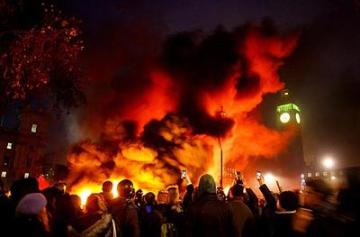On November 10th, the National Union of Students (NUS) and Universities and Colleges Union (UCU) organised a demonstration against cuts in education, which ended in an occupation of Tory offices at Millbank, with smashed windows and arrests. Two weeks later, tens of thousands of students marched in towns across the country, taking over roads and buildings and scuffling with police. The Solidarity Federation, which puts out Catalyst, has been one of the groups suggested in the press as the ringleaders of the trouble. Not only do we refute this, we call for more direct action against the cuts.
Of course some of our members – those studying or working in higher education – were at the demonstrations, but we cannot take credit for the storming of 30 Millbank or the events two weeks later when even a brief look at the video and photo evidence available shows that a wide cross-section of the national student community took part.
It is absurd and grossly patronising to attempt to pin such a widespread outpouring of anger on the heads of an apparent “hardcore of troublemakers” or “protest junkies,” in articles that sit alongside footage of student participants confirming that this was their first ever demonstration. Even if we were inclined to manipulate and control crowds, the chances of us successfully doing so as a small minority in the midst of irate thousands are surely minimal. What must really terrify the politicians is to see how red and black flags and masks have been hugely outnumbered by the hyped-up faces of students rejecting cuts to their education - cuts which now bear the fingerprints of all three major political parties.
Against this backdrop then, the treachery of NUS President Aaron Porter, who called the Millbank occupation “despicable” and accused genuinely angry students of “hijacking” his march, looks worse and worse. We can only assume that Porter is concerned about the effect that this will have on his credentials as a future Labour Party high-flyer, following in the footsteps of Jack Straw, Phil Woolas, and the like in using the NUS as a stepping stone into professional politics. The NUS is out of touch with ordinary students and we recommend they continue to organise themselves, rather than rely on the careerists – something which happened in places on the 24th.
Following the demonstrations, students occupied universities across the country. Students are already making links with university staff and future students in further education and schools, who are hit particularly hard by the fees as well as the removal of the Education Maintenance Allowance. This can be a truly effective movement if these encouraging developments continue.
We hope students will be the first of many to directly reject the cuts which affect us all and we will continue to organise against this scorched-earth austerity plan in our workplaces and neighbourhoods, democratically and independently of union leaders and politicians bleating the mantra “business as usual.” Only through struggle - direct action and solidarity between workers, students, the unemployed and the retired - can we fight back in this class war of the rich against the rest.
